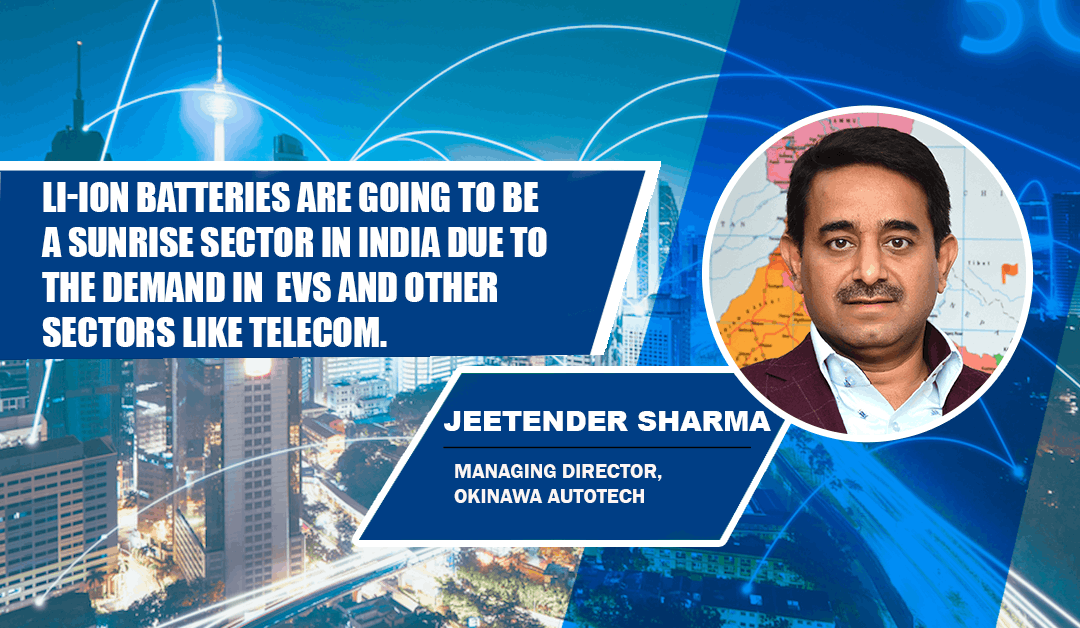“PLI scheme will push local manufacturing in future”
By EPR Magazine Editorial June 26, 2021 5:53 pm IST
By EPR Magazine Editorial June 26, 2021 5:53 pm IST

In an interview with EPR Magazine, Jeetender Sharma, Managing Director, Okinawa Autotech, talks about the emerging trends in EV battery and charging infrastructure in India.
How do you see the demand trend for electric vehicles in India?
The demand is growing as people are now aware of the concept of electric vehicles (EVs), their quality and performance. Also, the ever-increasing price of petrol and diesel has made people think over switching to EVs as they provide better economy and no pollution. During the second wave of this pandemic, we are seeing a huge demand for our electric two-wheelers.
How do you source the batteries for your vehicles?
We use only lithium-ion batteries in our products. We have a dedicated supplier for our vehicles. These batteries and components are specifically designed for Okinawa vehicles.
How do you look at the availability of Li-ion batteries in India?
The Li-ion battery pack consists of many components including the cell. The manufacturing of Li-ion batteries is slowly coming up in India and with the government support, probably the manufacturing can pick up in the next two years. Currently, the cells are being imported while other parts of the system are available locally. Though, it is up to the OEMs whether they have to use local parts or imported ones.
How are the government schemes like Atma Nirbhar Bharat and Make in India pushing the local manufacturing plans of Li-ion batteries?Yes, these schemes provide support not only for battery manufacturing but the overall manufacturing sector. Through these policies, the government is aiming to boost the Indian economy and this can happen by strengthening the local manufacturing and supply chain. The new PLI scheme is also looking at these possibilities and will support the Li-ion battery manufacturing in India. The objective is to make the domestic manufacturing up for the global supply, especially two-wheelers which is one of the biggest markets in the world. If we develop the EV sector the way IEC sector was developed, India is going to be a global supplier in EV sector also.
How is the EV charging infrastructure developing in the country?
EV battery charging station is required only for bigger capacity batteries of three-wheelers and four-wheelers. In Okinawa, we have a detachable Li-ion battery, you can charge at your own house or office like charging mobile phones. The reason behind the concept of detachable battery was not to depend on public charging infrastructure which can be time-consuming for the user. So charging is not a bottleneck for two-wheelers. But the government is working on charging infrastructure for bigger vehicles and many charging stations are coming up across the country. This is a good development and will change the consumer mindset toward EV vehicles.
Do you see any challenges in the Li-ion batteries market?
Currently, as we depend on other countries for sourcing the Li-ion batteries, there needs to be a planned approach in forecasting the requirements and getting the required quantity. Depending on another country is a bottleneck unless you plan the sourcing properly. Once the local production start picking up, we can source them in a better way. The government schemes like PLI can push the local manufacturing in future.
What is your outlook on the EV battery market and the charging infrastructure development in India?
There is going to be a big boom in the EV battery manufacturing because of the demand towards EVs and the policy support to promote EVs in the country. A lot of players are coming up in the battery manufacturing because of the PLI scheme and other government support initiatives. Those who are in the lead-acid battery business are now coming into Li-ion segment. Once the EV demand picks up, the demand for Li-ion batteries will go up. Li-ion batteries are going to be a sunrise sector in India due to the demand in not only EVs but also other sectors like telecom. For the charging infrastructure also, the government is coming up with incentives to encourage the EV consumers. Many petrol pumps in the country are now facilitating EV charging at their premises. There are many other organisations and start-ups are coming into charging infrastructure. This is going to be a good business in the next 5-10 years.
We use cookies to personalize your experience. By continuing to visit this website you agree to our Terms & Conditions, Privacy Policy and Cookie Policy.